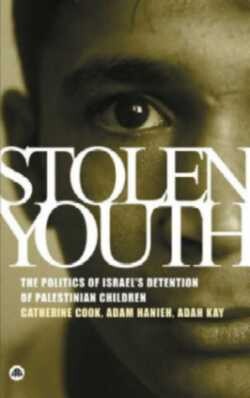11 March 2004

The panel of speakers included: Anne Beech, senior editor of Pluto Press; two of the book’s author’s Adah Kay and Catherine Cook; Jamal, a former Palestinian child prisoner; Dr Lynn Welchman of the University of London’s School of Oriental and African Studies and an expert in international humanitarian law; and the distinguished journalist and social commentator Beatrix Campbell.
Anne Beech opened the launch by offering thanks to a wide variety of individuals and institutions who assisted in making the launch possible, including the London Middle East Institute Outreach Programme at SOAS, Just Peace UK, The Council for Arab British Understanding, Jews for Justice for Palestinians and the Palestine Solidarity Campaign. Beech was followed by Kay and Cook who discussed the original inspiration for the book, the process of online collaboration that resulted in the manuscript and presented a number of the main arguments set out in the book.
Kay interviewed Jamal, who had spent 1.5 years in prison between the ages of 14 and 17 years and had been arrested four times. He described the first time he was targeted for arrest by the Israeli authorities at the age of 14, his brutal arrest and interrogation and the harsh prison conditions. Jamal spoke about how this experience affected him at the time, totally disrupted his education and has had a lasting impact on his life opportunities.
Dr. Lynn Welchman who followed the interview began by stressing that the abuses which Jamal recounted are a certainty: the human rights community has no doubt that Israel commits gross human rights violations in the occupied territories. She focused her comments on the failure of international governments, particularly the British government, to take measures designed to pressure Israel to abide by its commitments under international law, underscoring one of the key critiques offered in the book.
The final speaker, Beatrix Campbell praised Stolen Youth for providing a way of thinking that did more than draw attention to the injustice and suffering endured by Palestinian children; it explained how the harassment, interrogation and incarceration of children is part of a system of control. Drawing on her work in the UK and Northern Ireland, Campbell noted the significance of public space for childhood and how because children inhabit the street more than adults, occupation armies and hostile adults target them. She described how very young girls attending the Holy Cross School in Northern Belfast were assaulted daily by men screaming abuse at them, as they walked to school. Acknowledging the dangers of drawing close parallels, she noted how the bodies of children had become symbols of the demonic and despised ‘other’.
A question and answer session followed the speakers and then the panelists invited the Liberal Democrat Member of Parliament, Jenny Tonge to join the stage and say a few words. Tonge had that week been sacked from her position as party spokesperson after having said that she could understand why some Palestinians are pushed to blow themselves up. She spoke of the overwhelming support she had received from constituents in the UK who support Palestinian rights and stressed that the UK public must not allow Prime Minister Tony Blair to forget his oft repeated pre-Iraq war commitment to help bring peace to Palestine.
The panel presentation was preceded and followed by a reception. According to Pluto Press, book sales of Stolen Youth reached record heights. Additional events are currently being planned for the book’s release in North America.
Background
Stolen Youth is the first book to explore Israel’s incarceration of Palestinian children. Based on first-hand information from international human rights groups and NGO workers in the West Bank and Gaza Strip, it also features interviews with children who have been imprisoned. The result is a disturbing and often shocking account of the abuses that are being carried out by Israel, and that have been widely documented by human rights groups such as Amnesty, but have never been addressed by the international community.
The book presents a critical analysis of the international legal framework and the UN system, arguing that a major failure of these institutions is their appeal to neutrality while ignoring the reality of power. The book offers an explanation for these failures by locating the issue of Palestinian child prisoners within the framework of the Israeli overall system of control as a long-term political strategy.
The book is divided into three main sections: the first chapters introduce the major issues, and propose a framework for understanding Israel’s policy towards Palestinian detainees, particularly children. The second section examines the actual experience of children from the moment of arrest until their release from prison based on hundreds of affidavits collected from children released from prison. The final section of the book analyzes in detail the reasons underlying Israel’s incarceration of children and the impact on Palestinian society. It outlines Israel’s system of institutionalized discrimination and state torture, challenges the legitimacy of Israel’s “security” argument, and argues that Israel’s treatment of Palestinian detainees forms one pillar of a policy designed to quash resistance to the occupation.
Related Links